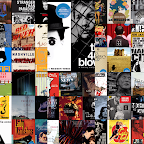 Director: Jonathan Demme
Director: Jonathan DemmeAlthough constructing the perfect first sentence is an extremely close second, to me, the most difficult task in writing is choosing a title for one’s work. Perhaps it’s the ultimate challenge of trying to select something with such an unforgettably captivating hook that it will irresistibly leap out at readers or perhaps it’s the undeniable struggle to pare one’s text down to its essence but whatever the case may be, it’s a perilous task that can not only either make or break a manuscript's success but also can cause a ripple effect among readers to judge something on the title alone. We may be told never to judge a book by its cover but in this day and age with limited attention spans and information or entertainment on demand, instant gratification is king and decisions are made in a snap.
More than anything else, it’s the title of former President Jimmy Carter’s book Palestine: Peace, Not Apartheid that sets off a tidal wave of polarizing reactions around the globe that makes his resulting promotional book tour explaining his motives and defending the text such an fascinatingly engrossing subject for filmmaker Jonathan Demme’s documentary Jimmy Carter: Man from Plains. Although, Carter repeatedly states that he wrote the book to help start the debate to hopefully lead to a peaceful resolution in the incredibly complex ongoing situation involving Israel and Palestine, it’s his choice of the word “apartheid” especially with its accusations pointed towards a country that has numerous citizens who were survivors or relatives of those who lived during the Holocaust that caused some prominent politicians and numerous angered citizens to condemn the book including large numbers who, unable to get past the title, refused to read the work at all.
Attacked as a bigot, liar, Anti-Semite, coward, and plagiarist among other negative charges thrown at the eighty-three year old Carter as he goes from interview to interview and state to state, he bravely continues on with the tour explaining that he doesn’t feel he’s less sympathetic to Israel in the text and more than anything says that the most important issue and aim from his book is hoping to bring peace to Israel and Palestine. Although I haven’t read the book and therefore cannot make any accurate and unbiased judgments on the contents of the book, I do wholeheartedly understand the reaction to the unfortunate title word “apartheid,” and was very impressed by Demme’s decision not to interject himself or voice his opinions in the documentary (beautifully shot by Declan Quinn), but rather to let events unfold naturally as he, along with most of the viewers, realize that the best person to explain himself is the charismatic Carter.
And whether we agree with him or not, it’s still such a tremendously intimate and powerful look at the man who, with his admirable involvement in global affairs including the organization Habitat for Humanity, reminds us how important it is for the Presidents of the past to use their unrivaled knowledge and alliances around the globe to stay involved in making this a united world where, even though we may have our differences, we respect and value others enough to listen even when the words (whether they are spoken or written) may not be to our liking.













